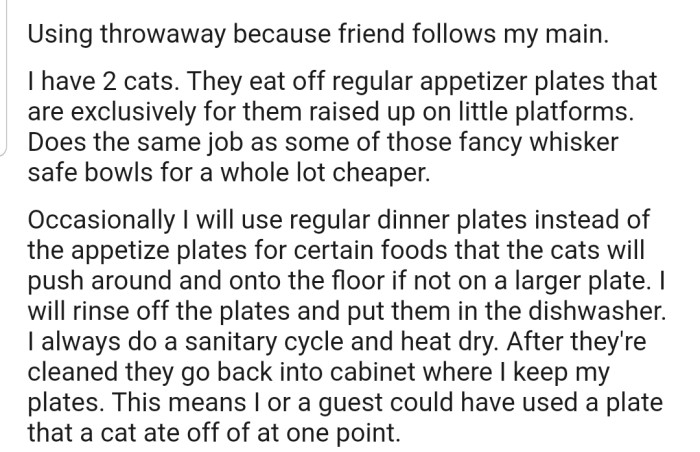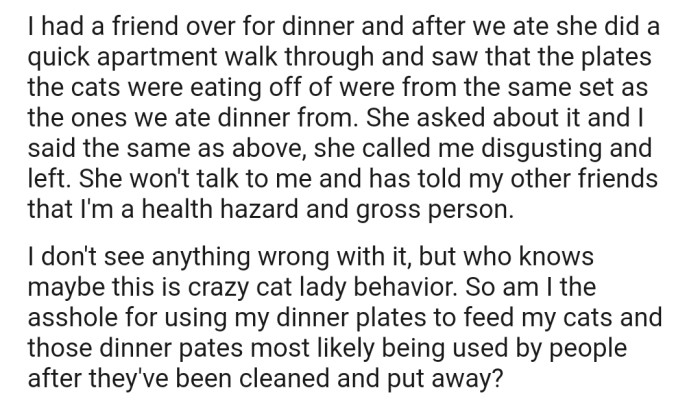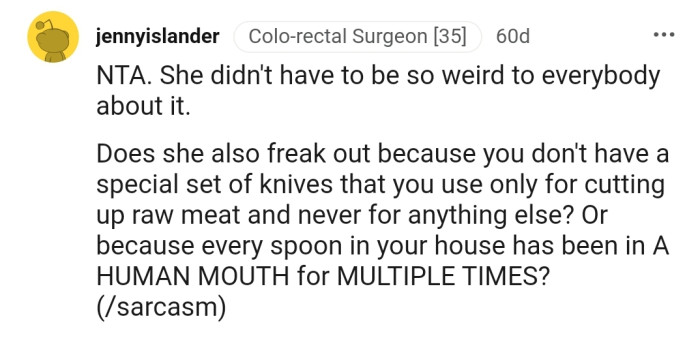Redditor Gets Chewed Out By Friend For Serving Guests From The Same Plates Her Cats Sometimes Use
Cats are on the top list for many people who want to own a pet. Although they still fight for the top spot with dogs, these felines are a fan favorite.
Research shows that the number of cats owned worldwide is 373 million. This shows how much people love cats—and what’s not to love about them? They are well known for being adorable and having the best fur for comfort pats.
Like all pets, cats require a specific form of care and attention that their owners try to provide to the best of their abilities. This was what one Redditor thought she was doing until she got called out for it.
OP shared on the AITA subreddit that she has two cats who eat off appetizer plates that are exclusive to them. However, OP occasionally uses regular dining plates to feed them.
Whenever she uses the dinner plates, OP rinses the dishes and puts them in the dishwasher. Once they are clean and dry, OP places them back in her plate cabinet.
One day, OP’s friend noticed that the plates OP’s cats were eating from were the same set as the ones they had eaten dinner from. She was very irritated and wasted no time telling OP how disgusted she was. Thereafter, she stopped speaking to OP and told her friends that OP was a gross person.
Although OP sees nothing wrong with using the same plates to feed her guests and cats, she couldn’t help but ask Redditors the AITA question.
Scroll down to see the verdict!
The story in detail

OP's cats eat off regular appetizer plates, rather than cat bowls

OP's friend found out about this, and now she won't talk to OP anymore. In addition, she has informed their friend group about what OP has been doing

Social Norms Around Pet Ownership
Serving food on plates that pets have used can evoke strong reactions due to societal norms surrounding cleanliness and hygiene.
Dr. Patricia Green, a behavioral psychologist, notes that these norms often stem from concerns related to health and safety, particularly in social settings.
Research published in the Journal of Health Psychology indicates that perceptions of cleanliness significantly influence social interactions and acceptance.
Navigating Social Norms Around Pets
Social norms surrounding pet care can lead to misunderstandings among friends and family. Research published in the Journal of Social Issues indicates that societal expectations can shape behaviors and preferences regarding pet ownership.
In this case, the unease about using shared plates reflects deeper concerns about hygiene and social boundaries.
The Social Dynamics of Pet Ownership
Serving guests from plates associated with pets can evoke strong reactions based on individual beliefs about cleanliness and pet care.
Research in social psychology indicates that people often project their values onto others, especially concerning hygiene and health.
Dr. Paul Rozin’s studies highlight how food-related decisions are deeply intertwined with cultural norms and personal beliefs.
Edit 1

Edit 2

Here's how the Reddit community reacted to this story:
"NTA. She didn't have to be so weird to everybody about it."

In this case, the friend's reaction likely stems from a combination of personal preference and societal conditioning around pet hygiene.
Studies show that people often project their values onto others, leading to conflicts when those values clash.
Understanding the source of these reactions can help individuals navigate similar conflicts more effectively.
From a psychological perspective, this reaction may stem from feelings of disgust or discomfort that can arise in shared living situations. A clinical psychologist explains that these feelings are often rooted in personal values and beliefs about cleanliness and responsibility.
Recognizing these underlying factors can help individuals navigate conflicts related to shared spaces more effectively.
When guests express discomfort about pet-related practices, it often reveals deeper social norms around cleanliness.
Studies show that individuals have varying thresholds for what they consider acceptable in shared environments, which can lead to misunderstandings.
Research published in the Journal of Environmental Psychology indicates that these conflicts can often be resolved through open dialogue.
"NTA. As long as the plates are cleaned after, what’s the big deal?"

"The dishwasher will do no less a good job cleaning the plates whether a human or a cat last used them."

"Personally, I would be grossed out by this, but I wouldn’t say you're a health hazard nor a gross person"

The Role of Communication in Social Conflicts
Effective communication is crucial in addressing conflicts arising from differing values and beliefs about pet ownership.
Dr. Samuel Roberts, a communication expert, emphasizes that discussing differing perspectives openly can lead to mutual understanding.
Research supports the idea that empathy and active listening can defuse tensions and promote healthier interactions.
The Importance of Communication in Shared Living Situations
Effective communication is essential for resolving conflicts in shared living environments. Research indicates that open dialogue can significantly improve relationships among roommates and friends.
Establishing clear expectations about shared responsibilities can help reduce misunderstandings and foster a sense of cooperation.
Managing Guest Expectations
It's crucial to manage guest expectations around pet ownership, particularly in social settings.
Research in hospitality psychology suggests that clear communication about household norms can prevent discomfort for guests and hosts alike.
According to studies, setting expectations can create a more enjoyable atmosphere for everyone involved.
"My friends kid vomited on a plate and we scraped it of and ran it through the dishwasher."

"A cat eating off of a plate isn't going to contaminate it in any way that washing it won't take care of."

"Some people do get the ick at that. I get it. But your friend calling you a health hazard to others and avoiding you is uncalled for."

To navigate this situation, it’s essential for individuals to approach the conversation with empathy and openness.
Using 'I' statements can help express feelings without placing blame, facilitating a more constructive dialogue.
Additionally, establishing common ground regarding pet care and hygiene can help resolve conflicts and foster understanding.
To address concerns about hygiene and shared spaces, it may be beneficial to have a candid conversation about expectations regarding pet ownership. Creating an environment where both parties feel comfortable expressing their concerns can promote understanding and resolution.
Additionally, involving a neutral third party, such as a counselor, can facilitate these discussions and enhance emotional safety.
To navigate these delicate situations, it may be beneficial to have a clear discussion with guests before serving food.
Explaining pet care practices and offering alternatives can help ensure that everyone feels comfortable.
Additionally, being receptive to guests' concerns can foster a welcoming environment and reduce tensions.
"NTA - if the plate is washed afterwards, who the hell cares who eats off of it?"

Many commenters believe OP is NTA since she washes the plates after the cats use them. However, some admitted that they would also be disgusted by OP’s actions.
Yet, they feel that OP’s friend’s reaction was a bit too much. Do you agree with the commenters, or do you think OP deserves the AH title?
Let us know in the comments below!
Psychological Analysis
This scenario emphasizes how perceptions of cleanliness and hygiene can influence social interactions, particularly in pet-owning households.
Understanding these dynamics can facilitate better communication and more enjoyable gatherings.
Analysis generated by AI
Analysis & Alternative Approaches
Research highlights the importance of understanding social dynamics when it comes to pet ownership and hosting.
As studies indicate, 'Open communication about pet practices can enhance social interactions and minimize discomfort among guests.'
Understanding Emotional Triggers in Conflicts
Being aware of emotional triggers can significantly improve conflict resolution. Psychological studies suggest that recognizing personal triggers can help individuals manage their responses more effectively.
By reflecting on past experiences, individuals can gain insights into their emotional reactions, allowing for healthier interactions with others.
Encouraging empathy in shared living situations can also foster better communication. Taking the time to understand each other's perspectives can help reduce tension and promote a more cooperative environment.
Practicing active listening can further enhance understanding and validation of each other's experiences.
Creating a Respectful Living Environment
Ultimately, fostering respect and understanding in shared living situations requires effort from all parties involved. Research emphasizes the importance of collaboration and compromise in maintaining harmonious relationships.
By working together to establish shared boundaries and responsibilities, individuals can create a supportive and respectful environment.
It’s essential for individuals to recognize that conflicts are a natural part of shared living. Approaching conflicts with a mindset of curiosity rather than defensiveness can facilitate healthier resolutions.
By prioritizing empathy and open communication, individuals can navigate challenges more effectively and build stronger relationships over time.
Psychological Analysis
This situation illustrates the emotional complexities that can arise in shared living environments. It's important for individuals to engage in open dialogue about their needs and boundaries to foster a sense of respect and understanding.
By addressing these conflicts collaboratively, they can create a more harmonious living situation.
Analysis generated by AI
Analysis & Alternative Approaches
Understanding the dynamics of shared living situations is essential for fostering healthy relationships. Research indicates that clear communication and respect for boundaries can significantly improve cohabitation experiences.
As noted by conflict resolution experts, cultivating empathy and collaboration can lead to more harmonious living arrangements.
Psychological Analysis
This situation highlights the importance of understanding differing perspectives on cleanliness and hygiene related to pet ownership.
It's crucial for individuals to approach these conversations with empathy to promote understanding and reduce tensions.
Analysis generated by AI
Analysis & Alternative Approaches
In conclusion, navigating social norms around pet ownership requires sensitivity and understanding.
Research underscores the importance of communication and empathy in addressing conflicts that arise from differing values.
By prioritizing open dialogue, individuals can foster healthier relationships and navigate potential conflicts more effectively.



